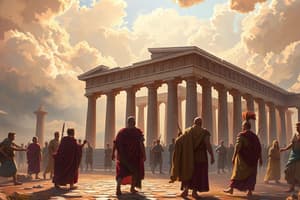Podcast
Questions and Answers
Which event marked a significant architectural turning point for Rome and Roman art in 211 BCE?
Which event marked a significant architectural turning point for Rome and Roman art in 211 BCE?
- Construction of the Mausoleum of Augustus
- Completion of the Arch of Titus
- Building of the Ara Pacis
- Significant developments in sculptural style (correct)
What was the primary purpose of the Ara Pacis in ancient Rome?
What was the primary purpose of the Ara Pacis in ancient Rome?
- To serve as a temple for Jupiter
- To honor the emperors of the late Republic
- To commemorate the Pax Romana (correct)
- To celebrate military victories
In what era was the Arch of Constantine built, and what does it signify?
In what era was the Arch of Constantine built, and what does it signify?
- Republic; celebration of Roman democracy
- Late Empire; the establishment of Christian authority (correct)
- High Empire; military achievements
- Early Empire; the transition to monarchy
Which architectural feature is Trajan’s Column best known for?
Which architectural feature is Trajan’s Column best known for?
Which of the following structures showcases the artistic and architectural trends of the High Empire?
Which of the following structures showcases the artistic and architectural trends of the High Empire?
Which structure is primarily associated with the celebration of Augustus' achievements and acts as a monumental tomb?
Which structure is primarily associated with the celebration of Augustus' achievements and acts as a monumental tomb?
Which monument was commissioned to commemorate the peace established by Augustus after years of civil war?
Which monument was commissioned to commemorate the peace established by Augustus after years of civil war?
Which of the following arches celebrates the military victories of the Flavian dynasty including the Siege of Jerusalem?
Which of the following arches celebrates the military victories of the Flavian dynasty including the Siege of Jerusalem?
Which monument reflects the achievements of Emperor Trajan, particularly his victories in Dacia?
Which monument reflects the achievements of Emperor Trajan, particularly his victories in Dacia?
Which arch was built to honor the triumph of Constantine the Great after defeating Maxentius at the Milvian Bridge?
Which arch was built to honor the triumph of Constantine the Great after defeating Maxentius at the Milvian Bridge?
Study Notes
Monarchies & Republics
- Rome was ruled by Latin and Etruscan kings from its founding (753 BCE) until the revolt against Tarquinius Superbus (509 BCE).
- The Republic lasted from the expulsion of Tarquinius Superbus until the bestowing of the title of Augustus on Octavian (27 BCE).
Early Empire
- The Early Empire began with the rule of Augustus and his Julio-Claudian successors and continued until the end of the Flavian dynasty (27 BCE - 96 CE).
High Empire
- The High Empire began with the rule of Nerva and the Spanish emperors, Trajan and Hadrian, and ended with the last emperor of the Antonine dynasty (96-192 CE).
Late Empire
- The Late Empire began with the Severan dynasty and included the so-called soldier emperors of the third century; the tetrarchs & Constantine (193-337 CE).
Roman Art and Society
- The eruption of Mount Vesuvius in 79 CE buried the city of Pompeii, preserving Roman art and civilization.
- The year 211 BCE marked a turning point for Rome and Roman art.
Rome, Caput Mundi
- Millions of people from various races, religions, languages, and cultures lived within the Roman Empire.
- Roman art and architecture influences the modern world.
Civic Architecture
- The center of civic life in any Roman town was its forum, a public square.
- Pompeii's forum is an example of Roman civic architecture, with its colonnades, Capitolium, and street layout designed for pedestrian and vehicular traffic.
- Roman temples, like the Capitolium, faced into the civic square, dominating the area.
Studying That Suits You
Use AI to generate personalized quizzes and flashcards to suit your learning preferences.
Related Documents
Description
Explore the fascinating timeline of Roman history from its monarchy through the various empires. This quiz covers key events from the founding of Rome, the establishment of the Republic, and the transitions through the Early, High, and Late Empires. Test your knowledge of the art and society that flourished in these epochs.




